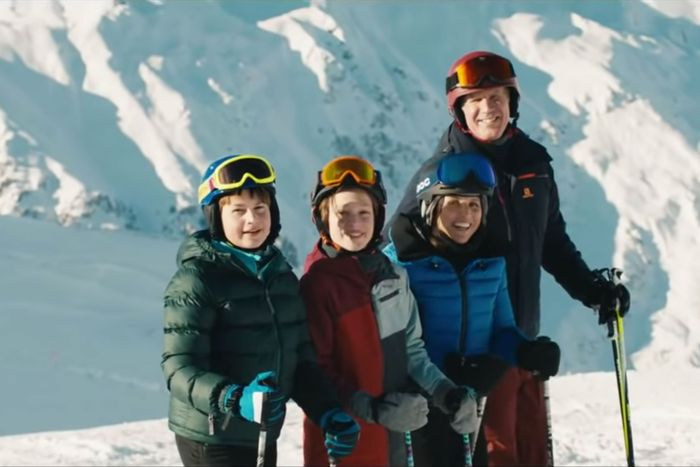
Ruben Östlund’s 2014 film Force Majeure — about a husband and wife whose relationship starts fraying after he abandons her and their kids during a moment of perceived danger at a ski resort — is so finely calibrated that the idea of an American remake sounds not just unnecessary but potentially disastrous. Östlund’s original, which keeps threatening to drift into comedy while maintaining the rough contours of a drama, is like a tightrope walker walking on top of another tightrope walker; the tonal balance it strikes is so delicate that one false move could send the whole thing spectacularly crashing down. Its inciting incident is ultimately a minor event, but the emotions and doubts it unleashes are not.
So now we have the Will Ferrell–Julia Louis-Dreyfus version Downhill, which just premiered at the ski-happy town of Park City and which at first sounds like a fake movie, the kind of ill-advised, overeager high-concept picture someone might have pitched in Robert Altman’s Hollywood satire The Player. But somehow Jim Rash and Nat Faxon’s remake (which they co-wrote with Veep and Succession’s Jesse Armstrong) manages to carve out a place for itself somewhere adjacent to Force Majeure. It can’t quite match the power of Östlund’s film, or its bemused, clinical (dare I say Scandinavian?) sensibility, but it has an awkward, American charm all its own.
The setup is largely the same. Pete (Ferrell) and Billie (Louis-Dreyfus) are on vacation in the Austrian Alps with their two kids. One day, as they eat lunch with others on the terrace of a restaurant, they see a controlled avalanche approaching from a good distance away. At first, it’s an interesting little sight. Then, chaos briefly reigns as the rolling, thundering cloud of white approaches and engulfs the entire terrace. Pete quickly grabs his phone and bails, leaving Billie and the two kids to sit there and get blasted by whatever that terrifying thing coming down the mountain was. It turns out to be … well, not much. Just a bit of snow flying through the air. It clears up quickly, and everybody takes their seats and proceeds as if nothing has happened; even the little menu stands on the tables don’t seem to have tipped over. Pete orders soup. But Billie is frozen with fear, visibly shaken. The visual strategy of the film changes, and suddenly the two leads are separated in discomfiting head-on shots that make them look like they’re talking directly to the audience.
The repercussions of this seeming nonevent, with its seismic emotional consequences, play out over the rest of their trip. They file a complaint with the resort’s safety office, where they’re informed (in rather Trumpian fashion) that the incident was “handled perfectly.” (Adds one scoffing official: “We’re not in America, where you sue because your coffee’s hot, madam.”) Billie’s rage at her husband’s nonchalance, and his defensive posture — first casual, then increasingly pathetic — starts to consume every interaction. They have it out in front of friends. They take time off from each other. It’s hard for either to put into words what they’re actually feeling, which lends a pleasant hesitancy to every scene. Little dryly comic bits are undercut by the characters’ ongoing apprehension. You want to laugh at times, but then you wonder if it’s okay to, which mimics what’s happening to these people onscreen.
It helps that Ferrell is years removed from his bull-in-a-china-shop glory days: He gives a quieter, more human performance than we’re used to from him. (At one point, his character offered up a sincere little smile, and I wondered if I’d ever previously seen a real smile from Will Ferrell, which is a wild thought to have about such a ubiquitous performer.) At the same time, he’s still Will Ferrell: He’s still the cosmic mark. You know this guy will screw things up soon enough, and his quietly dopey energy already puts this film in a different place than Force Majeure, which unfolded as a push-pull between equals. In Downhill, there’s an imbalance right from the start. Ferrell’s still doing humiliation comedy, just of a more understated kind.
Louis-Dreyfus, however, is the heart of the picture. She effectively downplays the potential humor of her scenes, committing instead to her character’s trauma. “I throw my arms around my children and I just wait … I wait for us to die together,” she recalls tearfully of the incident, and there is absolutely nothing funny about it. She is never going to shake that fear. Billie has an authority born of vulnerability, and we sense her trying to keep it together and failing. This imbalance — that of the guy who can amiably lumber through life with a chuckle and a woman who can’t afford to — already speaks volumes. Downhill luxuriates in this tension. It’s a genuinely unnerving little movie.
More From This Series
- The First Cinematic Masterpiece of 2021 Is Here
- Promising Young Woman Is an Incendiary Revenge Movie With a Sugar-Sweet Shell
- The Forty-Year-Old Version Isn’t the Quirky Underdog Comedy It Might Sound Like


